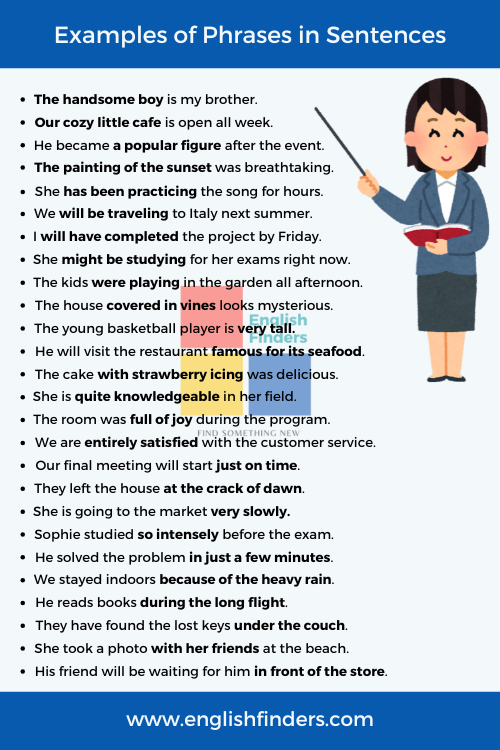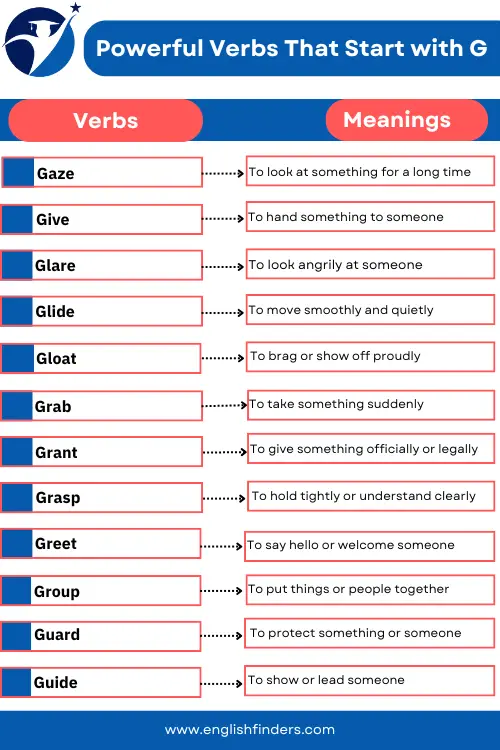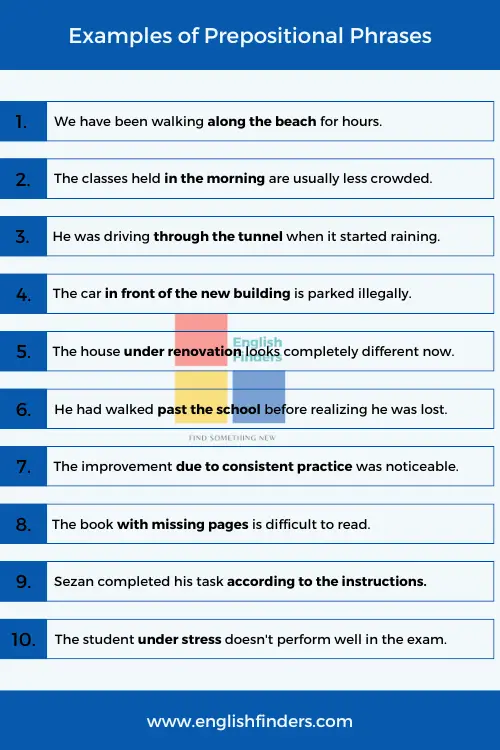Last updated on July 29th, 2025 at 02:53 pm
A phrase is a small group of words that work together to add detail or meaning to what we say. Unlike full sentences, phrases don’t have both a subject and a verb, but they can add a lot of character and color to our language.
In this lesson, we’ll guide you through 50 examples of phrases used in sentences. We’ll also explore different types of phrases, from noun and verb phrases to prepositional and adverbial ones. Each type of phrase will come with simple definitions and example sentences that you can try using in your own speech and writing.
What is a Phrase?
Quick Navigation
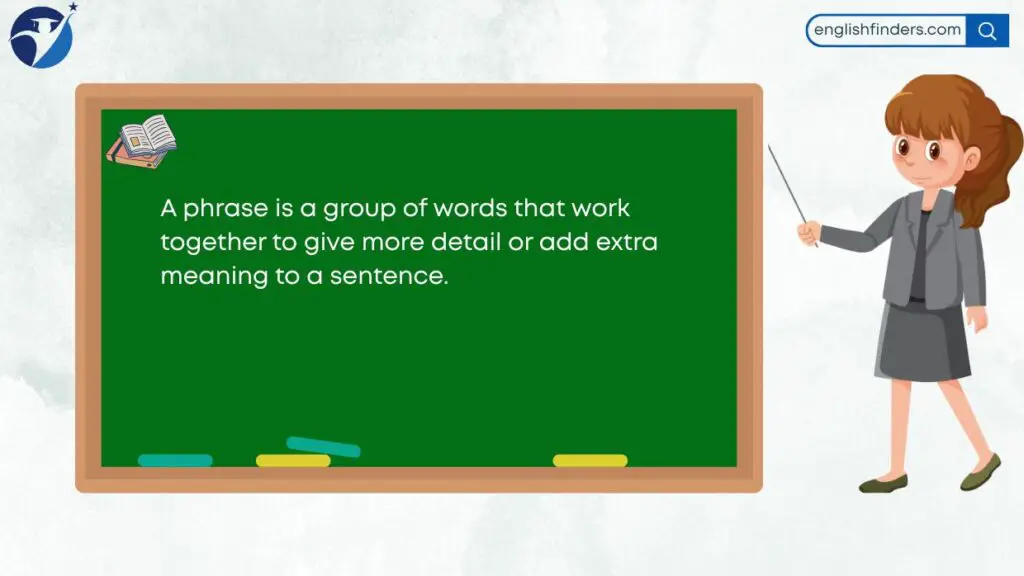
In simple terms, a phrase is a group of words that work together to give more detail or add extra meaning to a sentence. Unlike a full sentence, a phrase doesn’t have both a subject and a verb on its own—it’s more like a helpful addition to a sentence, giving us more information about the main idea. They add layers of meaning without creating complete thoughts on their own.
For example, in the sentence “The girl with the red hat smiled,” the words “with the red hat” form a phrase. This phrase tells us more about “the girl” without being a sentence by itself. Now, let’s dive into the various types of phrases and see how they’re used in sentences!
Types of Phrases and Examples in Sentences
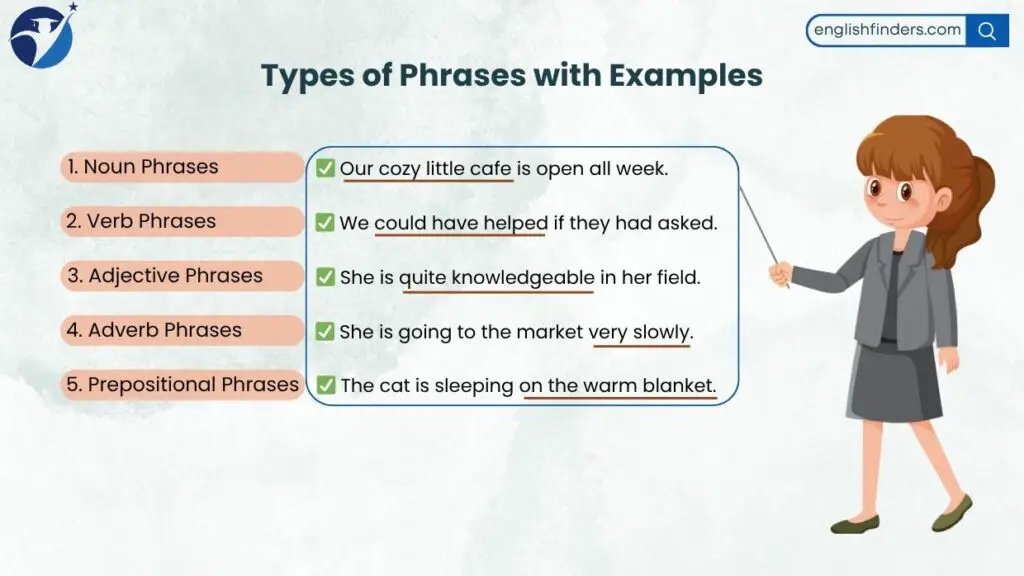
When it comes to phrases, there are several types that each play a unique role in adding meaning to our sentences. Understanding these types can help you use them more effectively in your own writing and speaking. Below, we’ll break down the most common types of phrases with simple definitions and examples in sentences. Let’s explore!
1. Noun Phrases
A noun phrase includes a noun and any words that describe or modify it. This type of phrase centers around a noun and provides more information about it.
- Example: “The tall, elegant building stood in the middle of the city.” Here, “the tall, elegant building” is a noun phrase that gives us more detail about the building.
2. Verb Phrases
A verb phrase includes a main verb along with any helping (or auxiliary) verbs. Verb phrases help to show the action or state of the subject in more detail.
- Example: “She has been working on the project all day.” In this sentence, “has been working” is a verb phrase that shows the ongoing action.
3. Adjective Phrases
An adjective phrase is a group of words that describe a noun. Adjective phrases give additional details that help to paint a clearer picture.
- Example: “The cake with chocolate frosting was delicious.” Here, “with chocolate frosting” is an adjective phrase describing the cake.
4. Adverb Phrases
An adverb phrase describes or adds information to a verb, adjective, or another adverb. These phrases answer questions like how, where, when, or why.
- Example: “She speaks in a very calm tone.” In this sentence, “in a very calm tone” is an adverb phrase explaining how she speaks.
5. Prepositional Phrases
A prepositional phrase begins with a preposition and includes a noun or pronoun. It often shows relationships of time, place, or direction.
- Example: “He sat under the tree to read.” Here, “under the tree” is a prepositional phrase describing where he sat.
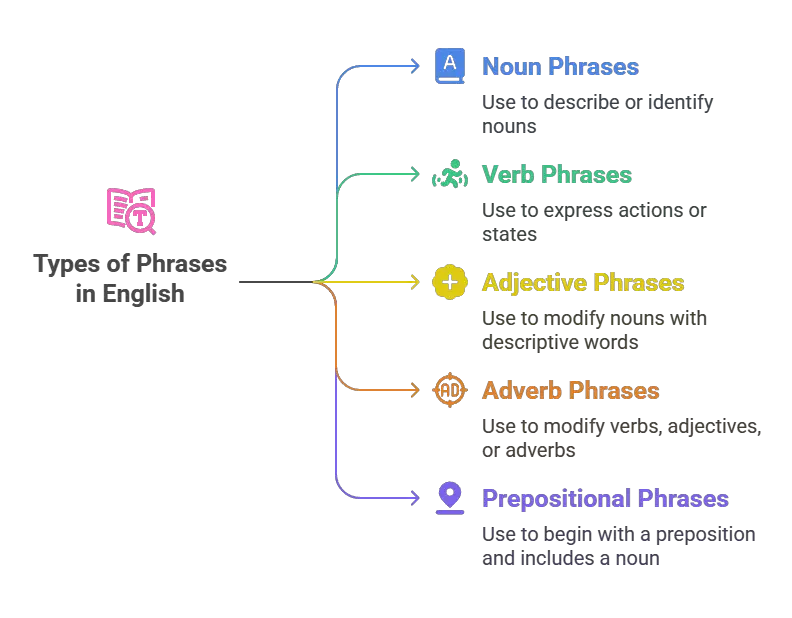
50 Examples of Phrases in Sentences
Let’s explore 50 useful examples of phrases in sentences.
Examples of Noun Phrases
- The young woman with the blue scarf is laughing brightly.
- A stack of books sat on the table by the window.
- She is known as a brilliant scientist around the world.
- The handsome boy is my brother.
- He became a popular figure after the event.
- Our cozy little cafe is open all week.
- A long list of ingredients was required for the recipe.
- The painting of the sunset was breathtaking.
- My favorite memory from the trip is seeing the Eiffel Tower.
- A talented musician will perform on stage next month.
Examples of Verb Phrases
- She has been practicing the song for hours.
- They are planning to visit their grandparents next month.
- He was watching TV when I called.
- We will be traveling to Italy next summer.
- She had finished her work before heading out.
- The kids were playing in the garden all afternoon.
- I will have completed the project by Friday.
- She might be studying for her exams right now.
- We could have helped if they had asked.
- He was reading a book when the lights went out.
Examples of Adjective Phrases
- The child with a bright smile is her son.
- The house covered in vines looks mysterious.
- The young basketball player is very tall.
- The child with curly hair ran across the playground.
- He will visit the restaurant famous for its seafood.
- They will have moved into a home surrounded by trees.
- The cake with strawberry icing was delicious.
- She is quite knowledgeable in her field.
- The room was full of joy during the program.
- We are entirely satisfied with the customer service.
Examples of Adverb Phrases
- She sang in an incredible way during the concert.
- Our final meeting will start just on time.
- They left the house at the crack of dawn.
- She is going to the market very slowly.
- We will finish the project in a timely manner.
- He spoke to us with kindness and patience.
- They walked through the busy streets of New York.
- Sophie studied so intensely before the exam.
- He solved the problem in just a few minutes.
- We stayed indoors because of the heavy rain.
Examples of Prepositional Phrases
- He reads books during the long flight.
- The cat is sleeping on the warm blanket.
- They have found the lost keys under the couch.
- She took a photo with her friends at the beach.
- His friend will be waiting for him in front of the store.
- The bird flew over the trees and disappeared.
- We waited by the entrance for their arrival.
- She has been keeping the letter in her drawer for years.
- They will have hiked through the mountains all day.
- The kids built a sandcastle near the water.
Final Thoughts
Understanding and using phrases is an effective way to make our English sentences sound more natural and expressive. Phrases help to add color and detail, turning basic sentences into more engaging, descriptive ones. As we’ve seen in these examples, phrases can vary in type and purpose, but each one adds a unique layer to our language.
Frequently Asked Questions
What is a phrase?
A phrase is a group of words that work together to add meaning to a sentence, but does not contain both a subject and a verb. Phrases can describe, clarify, or provide additional information about the main ideas in sentences.
How are phrases different from sentences?
Phrases do not express a complete thought and cannot stand alone as sentences. Sentences, on the other hand, must contain at least a subject and a verb, conveying a complete idea. For example, “The dog ran” is a complete sentence, while “The dog with the fluffy tail” is a phrase that requires a main clause to make sense.
Why are phrases important in English?
Phrases enhance our communication by making our language more descriptive and varied. They allow you to express complex ideas more clearly and can help improve your writing and speaking skills. Using phrases in sentences can also make our language sound more fluent and natural.

Azizul Hakim is the founder & CEO of englishfinders.com. He is a passionate writer, English instructor, and content creator. He has completed his graduation and post-graduation in English language and literature.

